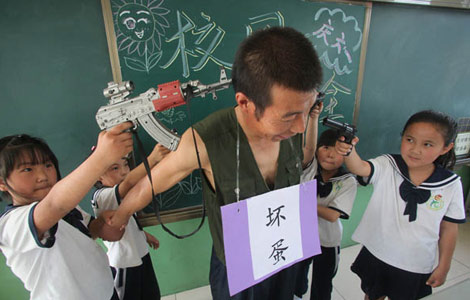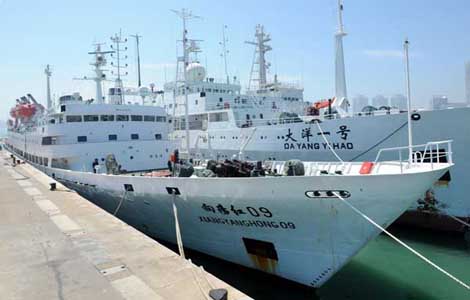
Universities in Singapore, an academic hotbed in Southeast Asia, are increasing cooperation with China, a move that insiders say reflects the global shift to the rising economic power.
Singapore Management University, or SMU for short, one of six colleges in the city-state, signed 13 agreements on academic cooperation and exchange with five Chinese partners in April, including Tsinghua University in Beijing and Fudan University in Shanghai.
"We've seen that China, as a rising economic power, has attracted worldwide attention," said Arnoud De Meyer, president of SMU. "I feel obligated to provide more opportunities for our students to interact with students in China. They're going to work together after graduation."
Chen Jining, president of Tsinghua University, agreed that globalization is important for the development of modern universities.
"A hundred years ago, Tsinghua, as a prep school for overseas universities, sent students abroad to learn advanced technology," Chen said at a news conference in April. "Now talented youths from all over the world gather at Tsinghua to learn and understand China."
In the agreement with Tsinghua, SMU and the Chinese college's economic and management school will exchange five to 10 students each year. Faculties from both sides will also work together to research and solve pragmatic problems.
SMU, which has about 8,000 students, was established only in 2000 but has already built a good international reputation for research, teaching and the quality of its graduates.
To reach further goals, De Meyer is adamant that students must be offered international opportunities.
As many as 84 percent of SMU's graduates in 2013 have overseas experience, either through student-exchange programs or internships.
"We want them to learn about overseas markets through staying abroad," De Meyer said, adding that the same goes for faculty cooperation.
Amy Wan, a 28-year-old Singaporean, works as front office manager at the Hilton Hotel in Kunshan, Jiangsu province. She first gained an understanding about Chinese culture, economy and business environment from a China Business Study Mission at SMU, which culminated in a two-week field trip to the Pearl River Delta region in 2007 to visit local and international companies. The following year she took part in a three-month internship in Shanghai.
"The immersion program made me more exposed to China," Wan said. "Having opportunities as a student to understand China helped to pave the way to being open to working and living here."
According to De Meyer, SMU hosts about 700 exchange students a year from all over the world, while 15 percent of its undergraduates are from overseas.
Chinese students generally account for a large proportion of international students in Singapore.
Pang Yang Hoong, vice-provost in charge of undergraduate study at SMU, said the majority of its international students are from China, and she encouraged more young Chinese to study there.
"We've seen many of our students chose study-abroad programs in the United States and Europe in the past," she said. "Many had been to China as tourists, but spent less time studying or working here.
"I hope the agreements we signed this time will allow more of our students to be able to study in China."
Pang added that tourists only scratch the surface of the country, but exchange students have more opportunities to interact with locals to enrich their vision and become globalized.
Singapore, as a mature and small country, can provide management experience to Chinese provincial officials, and universities may be the best place to do it, suggested Annie Koh, vice-president of SMU. The college has previously provided short-term training to government employees in Sichuan province.
"Singapore is not a big country," she said. "Our management experience may be suitable for provinces."
Xu Liping, deputy director of China's Center for South Asian Studies, said he believed the strengthening of Sino-Singaporean ties through universities is a growing trend.
"Singaporean universities want to cooperate with China, catching a ride on its economic growth," Xu said.







